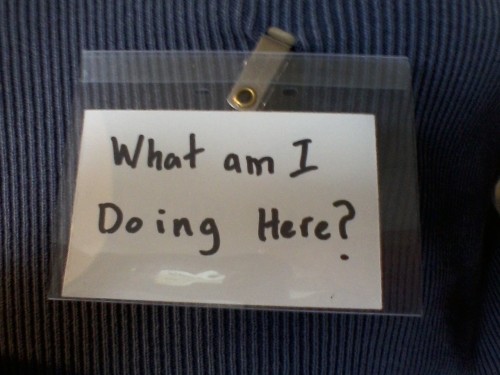Maximizing Your HighEdWeb Michigan Conference Experience
The first-ever HighEdWeb Michigan conference is coming to Flint’s Riverfront Center in just a matter of days. This is an exciting opportunity to learn from peers working in higher education throughout the region. Preeminent content strategist Kristina Halvorson’s keynote address alone will be worth the price of admission. The two-day conference is also packed with presentations focused on aspects of higher education which you may have thought nobody else was wrestling!
The following are tips, both general and specific to UM-Flint, for making the most of your HighEdWeb Michigan conference experience:
• Fear not!
A large number of people on the UM-Flint campus recoil at the mere mention of the word “web.” Trouble is, many of those individuals are the ones charged with maintaining their department’s website! There are myriad reasons this phobia has festered: You are not a web designer, you’re an administrative assistant! The CMS is the opposite of intuitive—it’s outtuitive! You have been instructed to address other priorities first. When you do finally find time to take down that event from 2011 and replace it with something relevant, it doesn’t “look pretty.”
The truth is, with some fairly minor shifts in thinking—such as what actually constitutes a good website (relevant content over “prettiness”), what skills are really required (no design or tech degrees needed), and where student service priorities really ought to be in the world of 2013 (way more students visit your website looking for info and answers than ever phone or knock on your door)—you can become an adept web contributor and a real asset to your unit. Keep in mind, if you are responsible for communicating, you are already a web person.
Conferences like HighEdWeb are meant for individuals open to making these shifts. As a matter of fact, these conferences are, in large part, organized by and feature presentations from individuals who have made such shifts themselves. Much of the learning that is imparted by these peers comes out of the lessons they learned from attempts (and frequently failures) to effectively shift their working relationship with “the web.” They have been in your shoes. They have experienced the same frustrations. They have made the same mistakes. But they persevere because they know technology and students’ needs aren’t going away. These individuals ‘get’ higher ed because, like you, they are higher ed. And they go out of their way to avoid making anyone feel intimidated or incapable. So fear not. There are no stupid questions. We’re all in this together!
• Mingle of the Minds
As important as it is to review and plan which presentations to attend, it is perhaps even more important to make the effort to meet and share ideas/issues with colleagues from other institutions. If someone attended the same session you did, it was likely for a similar reason. “I went to _____ presentation because our department is trying to figure out _______. Why did you pick this session?” Perfect ice-breaker!
It is often during conversations with other attendees where more detail and nuance and specificity can be explored and worked through. These discussions are fertile ground for new ideas and outright epiphanies. You may find someone you’ll want to keep in touch with to bounce ideas off or get input from before presenting an idea to the rest of your department. You may even make a new friend.
HighEdWeb Michigan has planned a special opportunity for just this kind of interaction at the Flint Institute of Arts. RSVP!
• UM-Flint Folks’ Focus
Perhaps focus isn’t the right word. As mentioned above, an open mind receptive to all ideas and all foci may be a more appropriate mindset than one lasered in on any narrow set of issues. Given the concern many have expressed about not being “very technical” (and again, this conference is not about advanced coding or the latest changes to HTML5), UM-Flint attendees may benefit from tuning their antennae towards these “three P’s”:
Priority – Making web a priority remains elusive for many departments on our campus. Chances are your supervisor is not attending this conference. It’s not yet a priority. Keep your ears open for evidence and arguments that can help you make the case that your department website must become a higher priority for your unit—and what can happen if it is not.
People – Even if your department has committed to moving your website up the priority list, that may not mean the people-power needed matches what is currently possible. Phones still need to be answered. Reports still need to be written. Budgets still need to be minded. However, we must also be mindful of the fact that websites are not robots. They do not automatically create, maintain, and remove content. People do. As you take in various presentations, ask yourself, “What are the day-to-day, human implications of making your website the priority it needs to be?”
Process – Whether your department has a full team of dedicated web workers or just a handful of people pulled together to “make it happen” along with other responsibilities, process is always paramount. Who does what when? And why? And how can that process be improved to create better content, to ensure outdated information is removed, to provide users what they want when they want it? In the end, that’s what it’s all about, right?
We know HighEdWeb Michigan will provide you with information and ideas you can put into action. Have no fear. Don’t be shy. And don’t forget to have fun!
For more suggestions about how to make the most of this or any conference experience, check out Scott Berkun’s oldie-but-goodie “How to Get the Most Out of Conferences.” For those just entering the world of content strategy, HighEdWeb Michigan keynote speaker Kristina Halvorson’s book Content Strategy for the Web is a great pre-conference read and permanent post-conference resource.



